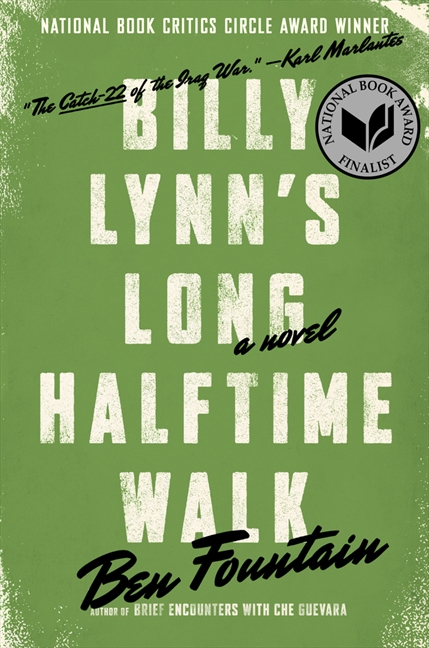Billy Lynn’s Long Halftime Walk
By Ben Fountain
Ecco, 307 pp., $28.99
It takes a particular kind of genius to set an entire novel around a football game’s halftime show. Sure, the halftime extravaganzas at the large NFL games offers lots in the way of spectacle, but you wouldn’t expect to find the experience of a lifetime compressed in one.
 Yet, that’s precisely what Ben Fountain achieves in his debut novel. Billy Lynn’s Long Halftime Walk is a biting, satiric contemplation on war, consumerism, American culture, love, life and death. That’s a lot to pack into one halftime, but Fountain pulls it off.
Yet, that’s precisely what Ben Fountain achieves in his debut novel. Billy Lynn’s Long Halftime Walk is a biting, satiric contemplation on war, consumerism, American culture, love, life and death. That’s a lot to pack into one halftime, but Fountain pulls it off.
Fountain’s protagonist, Billy Lynn, is a member of Bravo Company, a group of soldiers on leave from the war in Iraq. For an act of bravery under fire, they are being feted around the states with their final stop in Texas at a Dallas Cowboys football game on the Thanksgiving weekend.
The book employs first-person point-of-view from Lynn’s perspective, as the 19-year-old navigates a headache inducing tour of American types. (To be sure, one of the running jokes through the book is the soldier is constantly begging one of the aides attending to him for headache medicine, which never seems forthcoming.)
Accompanying Bravo Company is Albert, a film producer who’s convinced he can nail down a motion picture deal for their story, netting each one of them $100,000. Billy isn’t so sure. Albert told them two weeks ago they’d have a deal and it hasn’t happened yet. It becomes one of the worries that nags at Billy all through the game’s halftime.
During halftime at the big game, Destiny’s Child is going to perform. That becomes another current, as the men keep wanting to know whether they’ll meet the pop singers.
As Bravo Company is herded from place to place, signing autographs, talking to people about the war, they continually ascend into richer stratums of society. Finally they find themselves with the Cowboy’s owner, who takes a close interest in the soldiers and their story, to the point where he tries to hijack the movie deal.
The novel is a potent mix of literary styles, combining Ken Kesey’s sardonic black humour with the realism of Richard Ford. Like Ford, who set his trilogy of novels over Easter long weekend, Thanksgiving and Patriot’s Day, Fountain not only places his book over the Thanksgiving weekend, but within the even tighter confines of the periods leading up to, and including and after the halftime.
The setting of the football stadium also recalls Robert Stone’s far grimmer novel, A Hall of Mirrors, with its climatic nightmarish scene, also set in a stadium where rioting breaks out during a right-wing political rally. Fountain’s book contains echoes with its astringent portraits of football players, cheerleaders, reactionary rich folk and others.
Finally, Fountain’s exuberant language follows in the tradition of Tom Wolfe. Fountain possesses a real ear for dialect – people keep referring to nina levin; it took a minute to figure out they’re talking about 9/11 in the book. Like Wolfe, Fountain never met some onomatopoeia that he didn’t like. Take this scene, for instance, where the marching bands take to the centre field for halftime. “Heeuunh, hoooooo, hreeeee, horrrr,” the warlock barks, and the drums erupt in a driving rataplan, tatta-tottta-tatta-totta drrrp drrrrp boodly-boo, a stirring take on the runctions of the smitten human heart.”
That sentence is sheer poetry – and the book is full of such vivid, rich language.
Billy Lynn’s struggle is to make sense of America’s incredible wealth and comfort in relation to the terrible reality of the war to which he must return, and within that context to bring shape and understanding to his own life. These questions on money, morals, values and more are the same ones that we all ponder, and it is in that universality that Fountain has succeeded in creating an unforgettable and classic satire on the times in which we live.
Copyright © 2013 Charles Mandel

